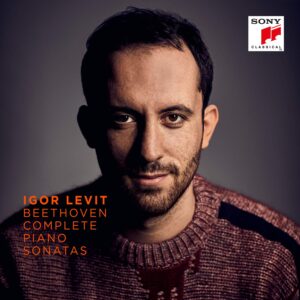Reviewing Igor Levit’s stunning 2013 solo CD debut featuring Beethoven’s last five piano sonatas, I wrote how the then-26-year-old pianist’s affinity for the composer’s essentially linear style and intense expressivity bordered on clairvoyance. Indeed Levit’s youthful ardor and mature intellect augured well for a complete Beethoven Sonata cycle, which he recently completed a few months past his 31st birthday in 2018. I won’t be surprised if Levit’s cycle will dominate among the many releases scheduled for Beethoven’s 250th birthday year. Just what makes his Beethoven so special?
For starters, Levit possesses a clear, virile, and well-balanced sonority from bottom to top, yet he’s never afraid to roughen up his sound to impart more visceral impact to the composer’s frequent sforzandos, consequently underscoring the music’s brasher qualities. Second, Levit’s superb technical facility allows him to vary his articulation according to Beethoven’s specifications with little help from the sustain pedal, as the Op. 31 and Op. 81a sonatas’ outer movements vibrantly bear out, or in the Op. 2 No. 3 Allegro assai’s rapidly fluttering right-hand runs and the fleet yet magnificently controlled Waldstein and Appassionata finales.
The heightened profile Levit brings to inner lines and counter-melodies also yields fresh insights. For example, I’ve rarely heard the thirds in the Op. 26 Scherzo’s left and right hands emerge in such playful dialogue, or the accompaniment underneath the main theme of Op. 14 No. 1 propel the music so urgently. And like Schnabel, Levit grants Op. 27 No. 1’s second movement its zany, rabble-rousing due.
The Op. 28 “Pastorale” is intriguingly stern (the starkly austere Andante) and giddy (the Rondo’s difficult coda simply flies off the printed page). Perhaps Op. 54’s Menuetto is a tiny bit staid and lacking in lilt, yet Levit’s deft handling of the Allegretto’s maze-like cross-rhythms and offbeat accents justifies his brisk pace. Levit’s headlong Op. 78 Rondo is the only interpretation I’ve heard to match Glenn Gould’s audacity while also taking Beethoven’s phrase markings on faith.
For detailed commentary about the last five sonatas, I refer readers to my aforementioned 2013 review of these performances when they first appeared. My high estimation of them has not changed, although Pollini retains the Apollonian edge in Op. 111, while Perahia now rules as the most three-dimensionally detailed guide to Op. 106’s Fugue since Claudio Arrau. The engineering’s concert-hall realism and Levit’s provocative annotations add value to a significant release from one of today’s most stimulating pianists.
































